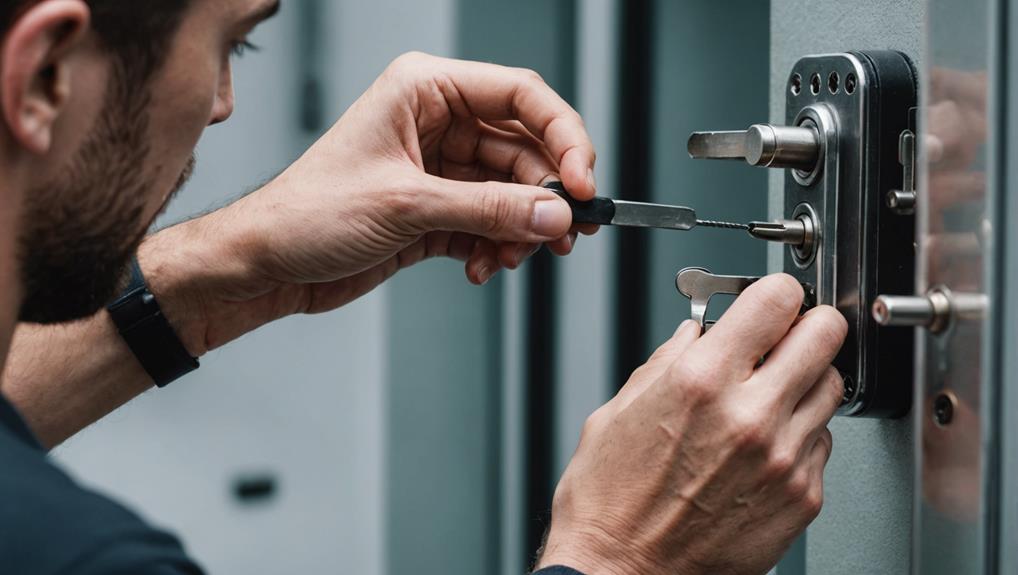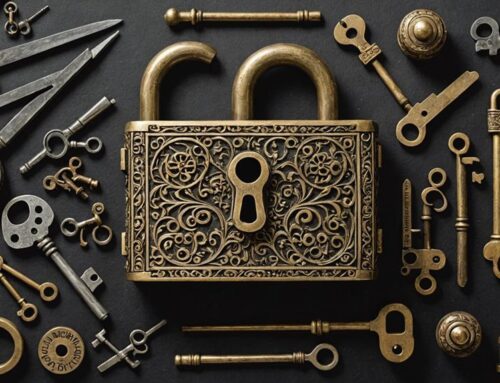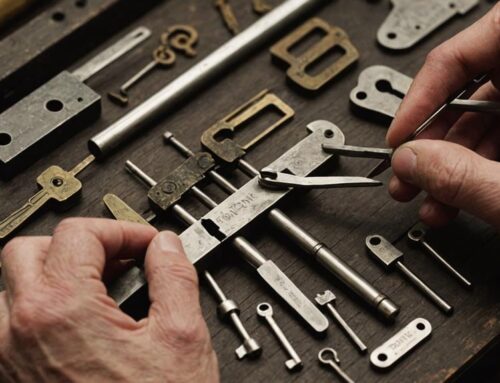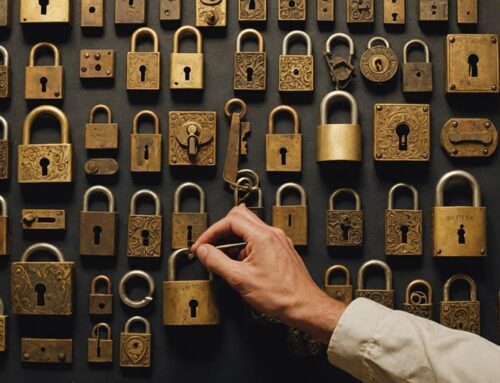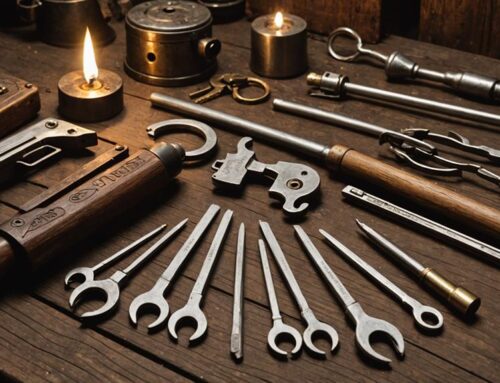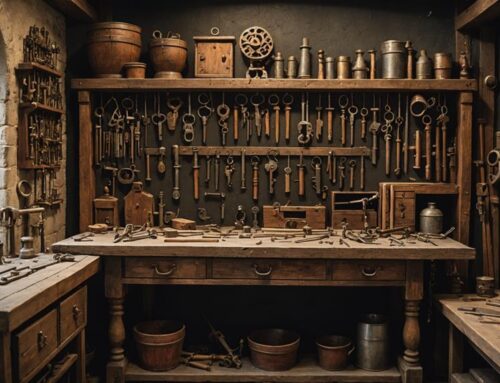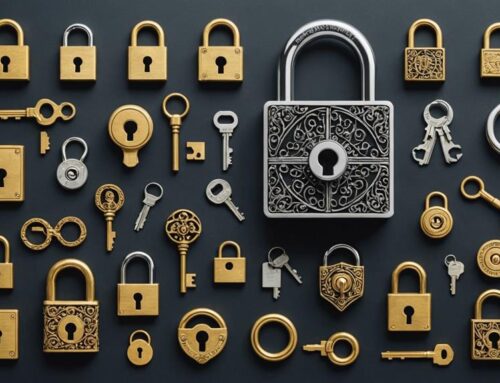When practicing ethical lock picking, make sure you follow legal rules and stay safe. Understand the laws related to lock picking in your area to avoid trouble. You can own lock picking tools as long as you use them legally and responsibly. Always get permission before trying to pick a lock, even for practice purposes. Keeping tools secure and respecting property rights are key aspects of ethical lock picking. By adhering to these guidelines, you can enjoy the hobby responsibly. If you want to enhance your knowledge further, there are more tips and insights available in the detailed information provided.
Key Takeaways
- Obtain explicit permission before picking any lock.
- Use quality tools with care to prevent damage.
- Adhere to local laws and ethical guidelines.
- Practice only on locks owned or with consent.
- Prioritize safety, legality, and responsible reporting.
Understanding Lock Picking Laws
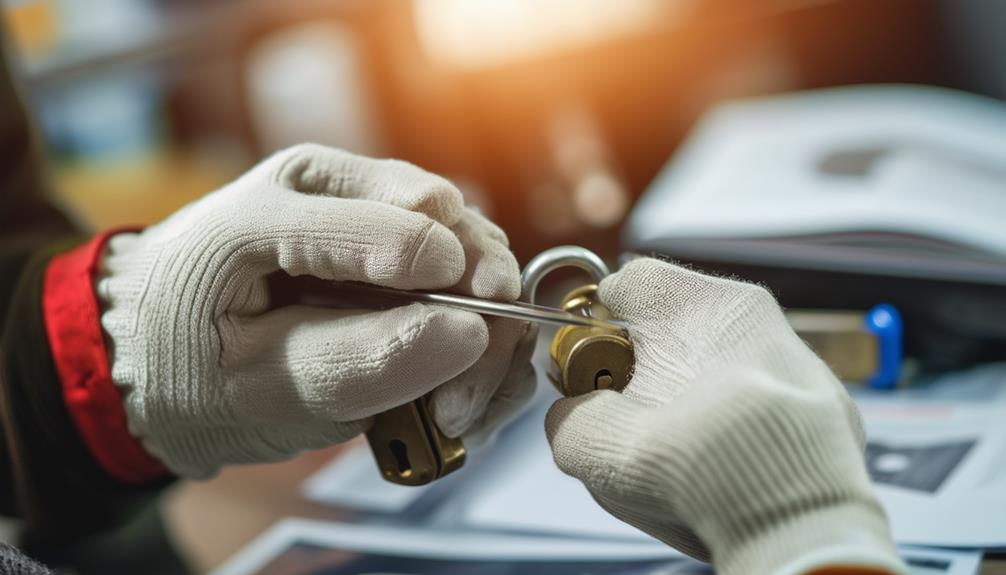
When it comes to lock picking, understanding the laws surrounding this practice is vital. Lock picking laws vary by state and country, so it's important to research and familiarize yourself with the specific regulations in your area.
Understanding lock picking laws can help you navigate the complexities of this skill. In most places, owning lock picking tools is legal as long as you don't intend to use them for illegal activities. However, using these tools on a lock without permission is generally against the law and can result in criminal charges.
Some regions have specific laws that prohibit the possession of lock picking tools with the intent to commit a crime, while others have restrictions on using these tools only in certain situations, such as by professional locksmiths.
It's important to be aware of these laws to avoid any legal trouble. Additionally, always verify that you have explicit permission before attempting to pick a lock, even if it's just for practice or educational purposes.
Using Lock Picking Tools Legally
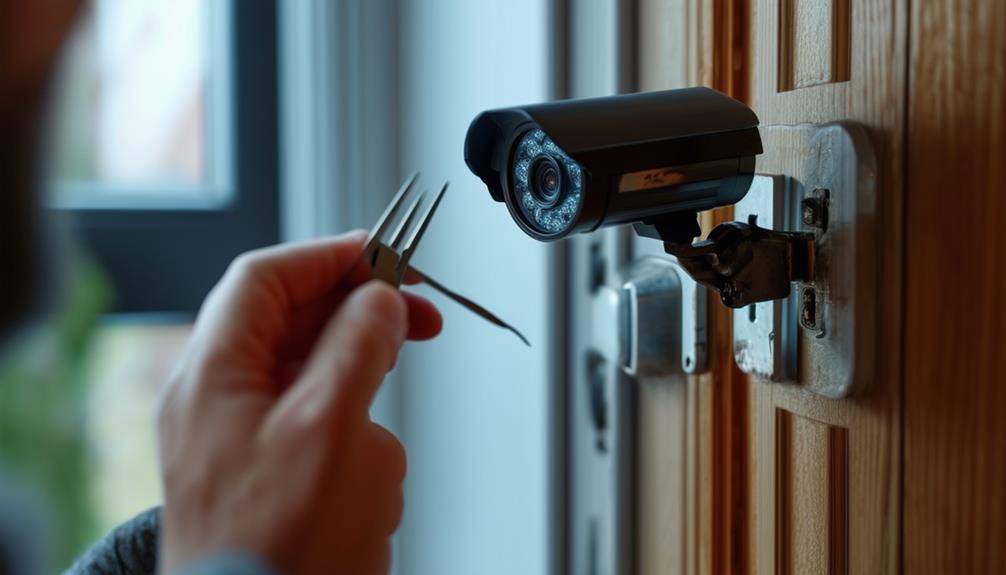
When it comes to using lock picking tools legally, it's vital to guarantee that you own the tools for lawful purposes.
Understanding the legal and ethical considerations surrounding lock picking is essential for all hobbyists Unlocking Ethics.
Always remember to handle your tools safely and responsibly to avoid any accidents or legal issues.
Additionally, consider the ethical implications of your actions and make certain you're using your skills in a responsible and ethical manner.
Legal Tool Ownership
To guarantee that you're on the right side of the law when it comes to owning and using lock picking tools, it's vital to be aware of the legal regulations surrounding their possession and usage.
In many places, owning lock picking tools is legal as long as you aren't using them for illegal purposes. However, some regions have specific laws regarding the possession of these tools, so it's imperative to research and understand the regulations in your area.
When purchasing lock picking tools, verify that you're buying them from reputable sources and that you're of legal age to possess such items.
It's also wise to keep your tools secure and out of reach of unauthorized individuals to prevent any misuse.
Safe Tool Usage
For legal and ethical use of lock picking tools, it's vital to understand and abide by the laws and regulations in your jurisdiction.
When practicing safe lock picking techniques, always guarantee that you have explicit permission to use your tools on a particular lock. Using lock picking tools without proper authorization can lead to legal consequences. It's important to only pick locks that you own or have been given explicit consent to practice on.
Additionally, make certain to handle your tools responsibly and keep them secure to prevent unauthorized access or misuse.
When using lock picking tools, prioritize safety by wearing protective gear such as gloves and safety glasses to prevent injury.
Remember to use the tools only for their intended purpose and avoid using excessive force that could damage the lock or the tool itself. Proper maintenance of your tools is also vital to guarantee they function correctly and safely.
Ethical Considerations
For those engaging in lock picking as a practice, guaranteeing ethical use of lock picking tools involves adhering to legal guidelines to avoid potential repercussions.
When practicing lock picking, it's vital to understand the laws and regulations surrounding the use of lock picking tools in your area. Ethical lockpicking practices entail using your skills responsibly, such as only picking locks that you own or have explicit permission to practice on.
It's important to never attempt to pick locks that are in use or without the owner's consent, as this could lead to legal consequences. Additionally, always carry your lock picking tools securely and discreetly to avoid any misunderstandings or suspicions.
By following ethical guidelines and respecting the laws related to lock picking, you can guarantee that you're practicing this skill in a safe and legal manner.
Obtaining Permission Before Picking
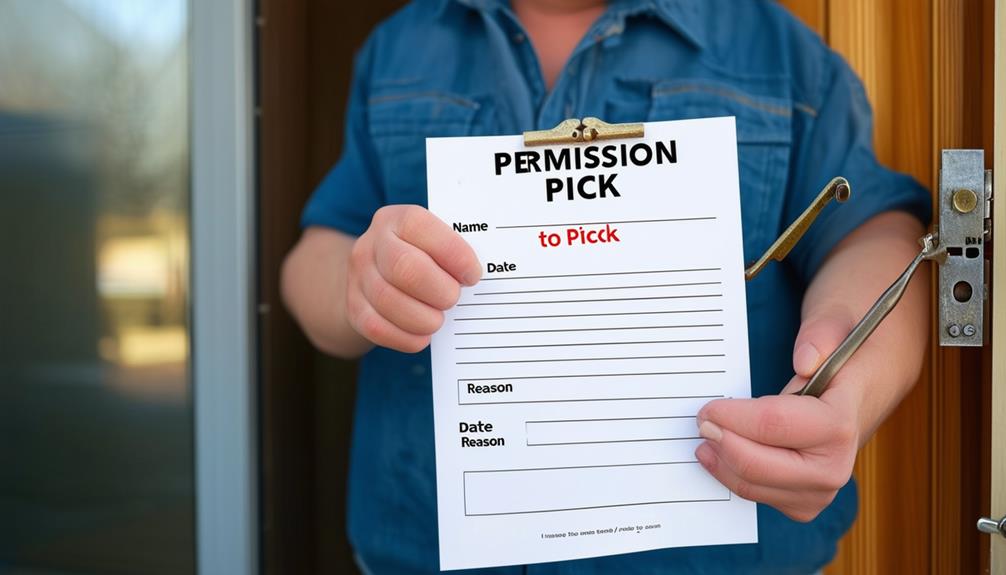
Before you attempt to pick a lock, it's vital to obtain permission from the property owner or authorized personnel. Obtaining permission before picking a lock is important for several reasons.
To begin with, it guarantees that you aren't violating any laws or breaching someone's privacy. Familiarizing yourself with the legal aspects of lock picking can help reinforce the significance of gaining consent. By seeking permission, you demonstrate respect for the property and its rightful owners.
Additionally, obtaining authorization promotes transparency and trust between you and the property owner, fostering positive relationships within the community.
To obtain permission, you can simply ask the property owner or the person in charge if you can practice lock picking on their locks. Explain your intentions clearly and honestly, emphasizing your commitment to ethical lock picking practices.
Remember that most people are understanding and may even appreciate your interest in enhancing your skills in a responsible manner. If permission is granted, make sure to adhere to any conditions or guidelines set by the property owner, such as not causing damage or making unauthorized duplicates of keys.
Always prioritize ethical behavior and respect for others' property when engaging in lock picking activities.
Practicing Lock Picking Safely
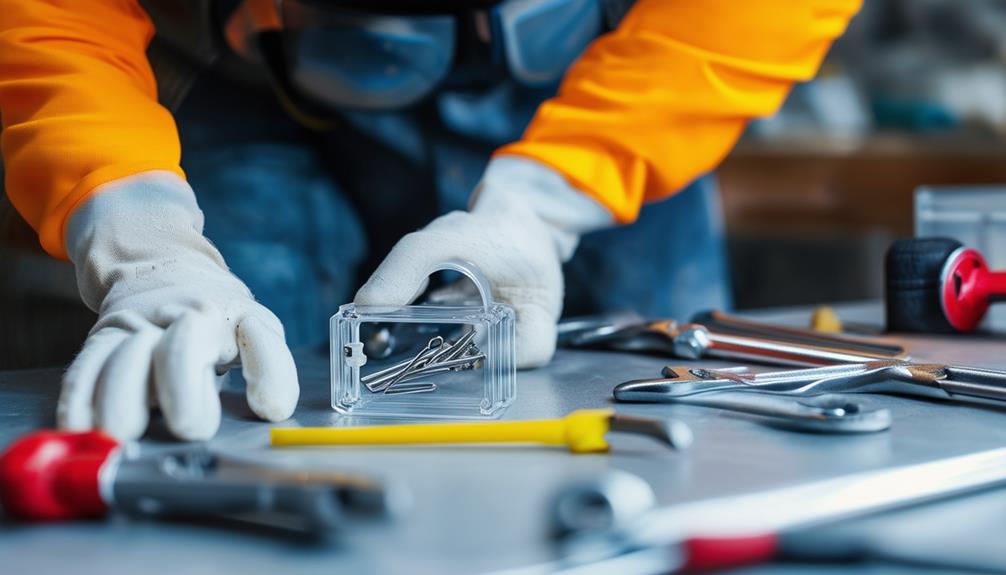
Practicing lock picking safely is vital to minimize the risk of accidents and damage to locks. When engaging in responsible lock picking practices, it's important to start with the right tools. Quality lock picks that match the lock you're practicing on can help prevent unnecessary strain on the lock mechanism.
Additionally, it's significant to familiarize yourself with the ethical considerations that come with this hobby. Before attempting to pick a lock, make sure that you're in a well-lit area where you can clearly see what you're doing. This not only helps you pick the lock more effectively but also reduces the chances of damaging the lock due to mishandling.
Another key aspect of safe lock picking is to practice on locks that you own or have explicit permission to pick. Avoid practicing on locks that are in use or that you don't have authorization to pick. This guarantees that you aren't inadvertently causing harm or invading someone's privacy.
Respecting Property and Privacy
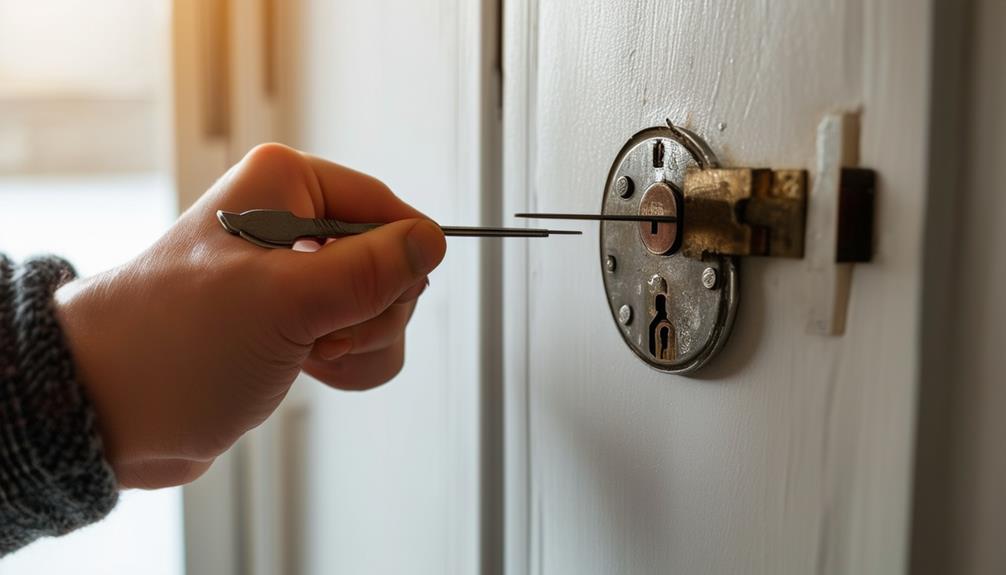
When engaging in lock picking, it's vital to be mindful of property rights and respect the privacy of others.
Always make sure that you have permission to practice your lock picking skills on a particular lock or property.
As emphasized in ethical lock picking practices, safe and legal techniques are indispensable for maintaining integrity in this hobby.
Remember that respecting property and privacy not only upholds ethical standards but also fosters a culture of trust and responsibility within the lock picking community.
Property Rights Awareness
Respecting property rights and privacy is a fundamental aspect of ethical lock picking techniques. When engaging in lock picking, it's important to remember that you're interacting with someone else's property.
Understanding and acknowledging the property rights of others is vital to maintain ethical conduct in the practice of lock picking. By respecting these rights, you demonstrate integrity and a commitment to ethical standards.
Lock picking ethics dictate that you should only attempt to pick locks that you own or have explicit permission to pick. Engaging in lock picking without proper authorization can lead to legal consequences and breaches of privacy.
It's essential to be aware of the boundaries set by property rights and to always prioritize the privacy of individuals.
Privacy Considerations
To guarantee ethical lock picking practices, it's imperative to maintain a strong focus on privacy considerations. When engaging in lock picking, it's vital to respect the privacy of individuals and the confidentiality of their belongings.
Always make certain that the property you're attempting to access belongs to you or you have explicit permission to practice on it. Be mindful of the potential invasion of privacy that unauthorized lock picking can cause. Protecting privacy isn't just about legality but also about ethical behavior and showing respect for others' property.
Furthermore, when honing your lock picking skills, prioritize practicing in controlled environments such as your own property or with the permission of the property owner.
Avoid attempting to pick locks in public spaces or on property that you don't have explicit consent to practice on. By adhering to these privacy considerations, you can uphold ethical standards in your lock picking endeavors while also demonstrating respect for property rights and privacy.
Reporting Vulnerabilities Responsibly
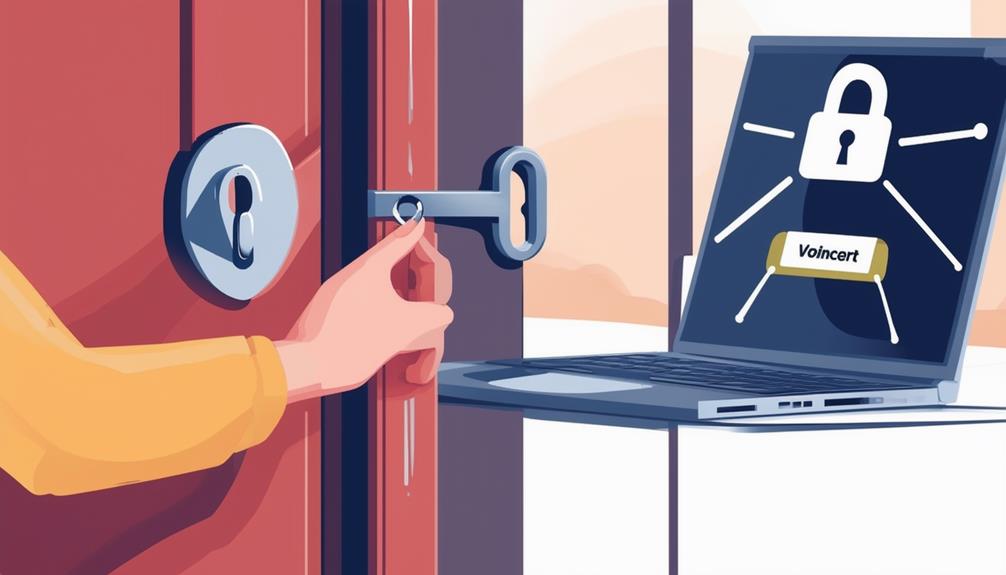
If you identify a security vulnerability during your ethical lock picking endeavors, ensuring it's reported responsibly can play an important role in maintaining the integrity of the systems involved.
Understanding the significance of lock picking in security testing can help you appreciate the need for responsible practices. Responsible reporting involves notifying the appropriate parties about the vulnerability without exploiting it for personal gain or malicious purposes.
When reporting a vulnerability, provide a detailed description of the issue, steps to reproduce it, and potential impacts it could have on the system. It's vital to give the system owner a reasonable amount of time to address the vulnerability before disclosing it publicly.
By reporting vulnerabilities responsibly, you contribute to improving the overall security of the systems you interact with during your ethical lock picking activities.
Remember that responsible disclosure not only protects the system but also showcases your commitment to ethical practices in the field. So, if you come across a vulnerability, be sure to report it promptly and ethically to help safeguard the systems you engage with.
Joining Ethical Lock Picking Communities
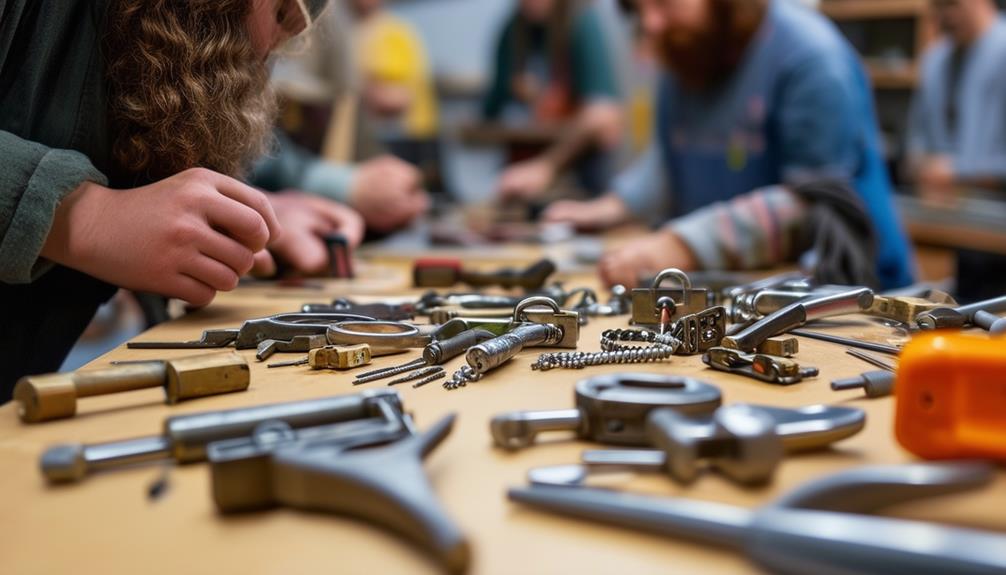
Joining ethical lock picking communities can offer valuable opportunities for learning and networking in a supportive environment. These communities are spaces where individuals interested in lockpicking ethics come together to share knowledge, tips, and experiences.
By joining such groups, you can engage with like-minded individuals who prioritize responsible and legal lockpicking practices. Understanding the importance of ethical use of lock picking skills and the legal implications associated with it is essential for fostering trust within these communities.
Within ethical lock picking communities, you may find mentors who can guide you in understanding the importance of using your skills ethically. These mentors can help you navigate the ethical considerations of lockpicking, such as respecting others' property and privacy.
Additionally, being part of these communities allows you to participate in discussions about the latest trends in lockpicking and emerging ethical challenges in the field.
Networking within ethical lock picking communities can also open doors to new opportunities, such as attending workshops, conferences, and training sessions focused on enhancing your skills while upholding lockpicking ethics.
Frequently Asked Questions
Can Lock Picking Skills Be Used for Emergency Situations?
Yes, lock picking skills can be valuable in emergency situations.
Knowing how to pick a lock could help you gain access to a locked door in urgent scenarios, such as being locked out of your home or car.
It's important to remember to only use these skills ethically and legally, ensuring you have permission to access the locked area.
In emergencies, having this knowledge could be a useful tool to assist yourself or others.
Is It Legal to Pick Locks in Self-Defense Scenarios?
Yes, it's legal to pick locks in self-defense scenarios.
If you find yourself in a situation where you need to pick a lock to protect yourself or others, most jurisdictions consider it justifiable.
However, it's essential to remember that the use of lock picking should only be in legitimate self-defense situations and not for any illegal activities.
Always prioritize safety and legality when using lock picking techniques for self-defense purposes.
How Can I Ensure My Lock Picking Practice Is Ethical?
To guarantee your lock picking practice is ethical, always obtain permission before picking a lock.
Make sure you have the necessary skills and knowledge to pick the lock without causing damage.
Use your skills responsibly and never pick a lock unless you're authorized to do so.
Remember that ethical lock picking involves respecting the property rights of others and only using your skills for legitimate purposes.
Are There Specific Tools Recommended for Ethical Lock Picking?
When diving into ethical lock picking, guarantee you have the right tools in your kit.
Recommended tools include a tension wrench, a hook pick, and a rake pick. These essentials will help you finesse your skills and tackle different types of locks effectively.
What Should I Do if I Accidentally Damage a Lock While Practicing?
If you accidentally damage a lock while practicing, stop immediately to avoid further harm.
Assess the situation and determine if you can rectify the damage. If not, consider seeking professional help to fix the lock.
Take responsibility for the mistake and learn from it for future practice.
Conclusion
To sum up, remember that with great lock picking power comes great responsibility. By following ethical practices, obtaining permission, and respecting laws, you can enjoy the art of lock picking safely and legally. As the saying goes, "With great power comes great responsibility." So, keep practicing your skills, but always remember to do so in a way that is respectful and lawful. Happy picking!

